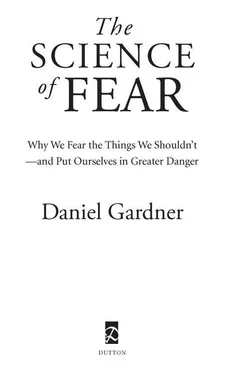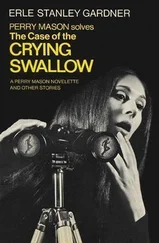Daniel Gardner - The Science of Fear
Здесь есть возможность читать онлайн «Daniel Gardner - The Science of Fear» весь текст электронной книги совершенно бесплатно (целиком полную версию без сокращений). В некоторых случаях можно слушать аудио, скачать через торрент в формате fb2 и присутствует краткое содержание. ISBN: , Издательство: Penguin Group (USA) Incorporated, Жанр: Психология, Политика, Прочая научная литература, на английском языке. Описание произведения, (предисловие) а так же отзывы посетителей доступны на портале библиотеки ЛибКат.
- Название:The Science of Fear
- Автор:
- Издательство:Penguin Group (USA) Incorporated
- Жанр:
- Год:неизвестен
- ISBN:9780525950622
- Рейтинг книги:3 / 5. Голосов: 1
-
Избранное:Добавить в избранное
- Отзывы:
-
Ваша оценка:
- 60
- 1
- 2
- 3
- 4
- 5
The Science of Fear: краткое содержание, описание и аннотация
Предлагаем к чтению аннотацию, описание, краткое содержание или предисловие (зависит от того, что написал сам автор книги «The Science of Fear»). Если вы не нашли необходимую информацию о книге — напишите в комментариях, мы постараемся отыскать её.
The Science of Fear — читать онлайн бесплатно полную книгу (весь текст) целиком
Ниже представлен текст книги, разбитый по страницам. Система сохранения места последней прочитанной страницы, позволяет с удобством читать онлайн бесплатно книгу «The Science of Fear», без необходимости каждый раз заново искать на чём Вы остановились. Поставьте закладку, и сможете в любой момент перейти на страницу, на которой закончили чтение.
Интервал:
Закладка:
Imagine a Stone Age hunter who falls asleep by the glowing embers of a campfire one night. When he opens his eyes in the morning, he is lying on a sidewalk in Times Square. That is System One, amazed, confused, and struggling to make sense of the world around him. It would be tough under any circumstances. Mistakes would be inevitable.
But the real trouble starts when this prehistoric refugee meets the merchants of fear.
2
Of Two Minds
On assignment in Lagos, Nigeria, several years ago, I went out late one night in a slum. If there were guidebooks to African slums, they would advise against this. I am visibly foreign, and in the slums of Africa foreigners are assumed to be wealthy people who carry large amounts of cash. In a poor, sprawling, tough city like Lagos, people who carry large amounts of cash have an unfortunate tendency to get robbed, murdered, or both.
As it turned out, my wallet was stolen in the gentlest manner possible— pickpocketed at a roadside canteen. I didn’t discover this until after the fact, but a local man I’d met said he thought he knew who did it. He also thought he knew where to find the culprit.
Together, we entered a maze of dirt paths and shanties where the only light came from campfires and kerosene lamps. Clusters of young men drank moonshine and stared at the foreigner. My new best friend asked around. No luck. But there was someone who could take me to a different place where the thief might be. And so in the company of another stranger, I plunged deeper into the humid, black night. I had lost all sense of where I was, and the sinking feeling in my stomach told me there was a good chance this was all going to end quite badly.
And yet, even as my skin grew clammy with sweat and fear, I kept going. It wasn’t the money in the wallet. My newspaper would cover that. It was the photograph of my two young children that I couldn’t get out of my mind. It was a cheesy Christmas photo done in a department-store studio with a painted backdrop of frosted windows and Santa’s sleigh flying through the night sky. Both my toddlers have big, goofy grins, thanks to a very dedicated photographer who made silly faces while balancing a rubber duck on her head.
I had half a dozen just like it at home. I knew that. I also knew it was only a photograph. And yet I couldn’t stop. I saw those grins. I imagined the wallet emptied of cash and tossed in a trash-filled gutter. I saw the photo lying in the filth, rotting, abandoned. I felt sick. Lost, miserable, and alone, I kept up the hunt for three hours. Finally someone told me I was a fool, that I could get my throat cut, and offered to guide me back to the hotel for a fee. I forced myself to accept.
The next morning, I shook my head in amazement. It still bothered me that my photo was gone, although the feeling wasn’t so intense. But what I had done was so absolutely, fantastically stupid. Why had I done it? I didn’t have a clue. It had been a long, exhausting day. It was late, I was tired, and I’d had a couple of beers. But surely that wasn’t enough to skew my judgment so badly. There had to be something else at work. I just didn’t understand what it was.
Indeed there was something else involved, as I discovered much later. It was my inner caveman—the ancient wiring of my unconscious mind—giving me some very bad advice.
We humans living in modern, wealthy countries like to think of ourselves as an advanced lot. We can read and write. We know the Earth goes around the sun and not the other way round. We are clean, shaved, and perfumed. We’re taller, healthier, and longer-lived than our ancestors. When we smile, the dental work we reveal would shock those who lived before the dawn of toothpaste and braces. And yet the one thing that is most responsible for making us who we are is not nearly so modern as our straight, gleaming teeth.
Between five and seven million years ago, the ancestors of chimpanzees and humans parted company on the primate family tree. Sometime around 2 or 2.5 million years ago, the brains of our ancestors ballooned from 400 cubic centimeters to about 650 cubic centimeters. That’s only a fraction of the 1,400-cubic-centimeter brain of an average modern human— Homo sapiens —but it was enough to mark the real beginning of humanity. The genus Homo was born.
Around 500,000 years ago, the ancestral human brain took another big jump—to 1,200 cubic centimeters. The final step came sometime between 150,000 and 200,000 years ago, when Homo sapiens first walked the plains of Africa. DNA analysis shows that every person alive today shares a common ancestor as recently as 100,000 years ago.
Evolution has two driving forces: natural selection and mutation. Natural selection favors traits that help an organism survive and reproduce, while weeding out those that hinder survival and reproduction. Other things being equal, a Paleolithic man with sharp eyesight and a strong arm had an edge over one who had neither. He was more likely to stay alive, to eat better, get a mate, and admire the keen eyesight and strong arm of his son. The shortsighted, skinny-armed man was more likely to end up in the belly of a lion. Over time, the eyes of the human population as a whole would become sharper, their arms stronger.
Genetic mutation is the source of the really major changes, however. In most cases, mutations have no obvious effect, or the effect is neither an advantage nor a disadvantage. These likely wouldn’t change the odds of a person surviving and reproducing, so natural selection would neither spread nor squelch them. Occasionally, a mutation produces a disaster—such as a deadly disease—that will make the person with the mutation much less likely to have children. A mutation like that is almost certain to vanish in a generation or two. But then there is the very rare case in which the mutation produces a new trait that gives its fortunate owner an advantage in the fight to stay alive and bounce children on his knee. Given a little time, natural selection will pass on this spot of luck to many others, maybe even the entire species.
The line between positive and negative mutations isn’t always clear, however. Some mutations do terrible harm to those who have them and yet they flourish because they also provide a benefit that outweighs the harm. The classic example can be found in West Africa, where about 10 percent of the population carries a genetic mutation that causes sickle-cell anemia—a disease that, without modern medical intervention, is likely to kill the victim before adolescence. Ordinarily, natural selection would quickly eliminate this mutation. It hasn’t because the mutation isn’t always deadly. Only if a child is unlucky enough to get the mutant gene from both parents does it cause sickle-cell anemia. If she gets it from only one parent, it will instead boost the child’s resistance to malaria—a disease that routinely kills children younger than five and that is rife all over West Africa. So the mutation kills in some circumstances and saves lives in others. As a result, natural selection has spread the mutation in the West African population, but only up to a certain level—because beyond that, more children would get the mutation from both parents and then it would take more lives than it saves.
Most people get this as far as physical traits go. The opposable thumb is mighty useful. Thank you, natural selection. And we also have no trouble talking this way about the brains and behavior of other species. Why do chimpanzee mothers nurture and protect their young? Simple: Natural selection favored this behavior and, in time, it became hardwired into chimp brains.
But the moment this conversation turns to human brains and actions, people get uncomfortable. The idea that much human thought is unconscious, and that evolutionary hardwiring is its foundation, is too much for many to accept. “I am not willing to assume,” wrote David Brooks, the New York Times columnist, “that our brains are like computers. . . . Isn’t it just as possible that the backstage part of the brain [meaning unconscious thought] might be more like a personality, some unique and nontechnological essence that cannot be adequately generalized about by scientists in white coats with clipboards?” What Brooks is saying here is what many of us vaguely sense: that the brain is a big, complex, physical organ at the center of which is some indefinable thing or entity that makes decisions and issues commands for reasons scientists in white coats will never be able to fathom.
Читать дальшеИнтервал:
Закладка:
Похожие книги на «The Science of Fear»
Представляем Вашему вниманию похожие книги на «The Science of Fear» списком для выбора. Мы отобрали схожую по названию и смыслу литературу в надежде предоставить читателям больше вариантов отыскать новые, интересные, ещё непрочитанные произведения.
Обсуждение, отзывы о книге «The Science of Fear» и просто собственные мнения читателей. Оставьте ваши комментарии, напишите, что Вы думаете о произведении, его смысле или главных героях. Укажите что конкретно понравилось, а что нет, и почему Вы так считаете.












